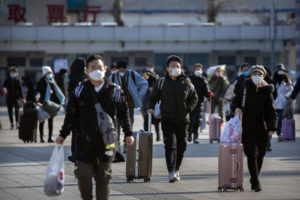Tax Havens Pose Threat to Oceans and Rainforests
Most of the foreign money funding ocean plunder and the felling of the Amazon forest comes from havens designed to conceal wealth and money flows of multinationals, politicians and the rich, researchers say. Searching for illegal fishing. (Bart Bauer, U.S. Navy / Wikimedia Commons)
Searching for illegal fishing. (Bart Bauer, U.S. Navy / Wikimedia Commons)
Tax havens have provided more than two-thirds of the foreign capital known to be linked to Amazon deforestation and pirate fishing, a new study says.
The researchers say 70% of known vessels involved in illegal, unreported and unregulated (IUU) fishing are or have been flagged under a tax haven jurisdiction. On average, they report, 68% of all investigated foreign capital (US $18.4bn of a total $26.9bn) which went to sectors associated with Amazon deforestation between 2000 and 2011 was transferred through tax havens.
The report is the work of a team of researchers from the Stockholm Resilience Centre (SRC) and the Global Economic Dynamics and the Biosphere programme (GEDB), who say it is the first study to show how tax havens are linked to economic sectors with the potential to cause serious global environmental damage.
They say the release of the Paradise Papers and Panama Papers exposed how multinationals, politicians and the rich use offshore tax havens to conceal their wealth and money flows, and to reduce their exposure to tax. Accepting that the term “tax haven” is contested, their report uses a definition proposed in a report prepared for the US Congress.
The study’s lead author, Victor Galaz, deputy director of the SRC, says: “Our analysis shows that the use of tax havens is not only a socio-political and economic challenge, but also an environmental one. While the use of tax haven jurisdictions is not illegal in itself, financial secrecy hampers the ability to analyse how financial flows affect economic activities on the ground, and their environmental impacts.”
The study, published in the journal Nature Ecology and Evolution, is part of an on-going research project, Earth System Finance: New perspectives on financial markets and sustainability, led by GEDB and the Stockholm Resilience Centre in collaboration with Future Earth.
Systematic Approach
The researchers say most previous analyses of the environmental impacts of tax havens are the work of investigative journalists focusing on a few locations. The new study, in contrast, takes a more systematic approach to analyse how the havens influence the sustainability of the ocean and the Amazon rainforest, two examples of the global environmental commons.
The Amazon forest is critical for stabilising the Earth’s climate system, and the oceans provide protein and income for millions of people worldwide, particularly in low-income food-deficit countries.
“The absence of a more systemic view is not surprising considering the chronic lack of data resulting from the financial opaqueness created by the use of these jurisdictions,” says co-author Beatrice Crona, GEDB’s executive director.
The study says lack of transparency hides how tax havens are linked to the degradation of environmental commons that are crucial for both people and planet at global scales.
It includes the first calculation of the foreign capital that flows into the beef and soya sectors operating in the Brazilian Amazon, both linked to deforestation.
The Cayman Islands proved to be the largest governmental source of transfers for foreign capital to both sectors. Well-known as a tax haven, the Islands provide three benefits to investors: legal efficiency, tax minimisation, and secrecy.
The study also includes a systematic analysis of tax havens’ role in global IUU fishing. With 70% of the vessels found to carry out or support IUU fishing, and for which flag information is available, flagged under a tax haven jurisdiction now or in the past, Belize and Panama are frequently mentioned.
Many of these tax havens are also so-called flags of convenience states, countries with limited monitoring and enforcement capacity that do not penalise vessels sailing under their flag even if they are identified as operating in violation of international law.
Dual Identities
This combination of tax havens and flags of convenience allows companies to operate fishing vessels with dual identities, one used for legal and the other for illegal fishing.
“The global nature of fisheries value chains, complex ownership structures and limited governance capacities of many coastal nations, make the sector susceptible to the use of tax havens,” says co-author Henrik Österblom, SRC deputy science director.
Among issues which the researchers suggest should be central to future research and to the governance of tax havens is the loss of tax revenue the havens cause. This, they argue, should be seen as an indirect subsidy to economic activities which damage the global commons, and organisations like UN Environment should assess the environmental costs involved.
And they argue that the international community should view tax evasion and aggressive tax planning as not only a socio-political problem, but also an environmental one. Putting tax havens on the global sustainability agenda, they say, is key to protecting the environment and achieving the UN Sustainable Development Goals.
Your support matters…Independent journalism is under threat and overshadowed by heavily funded mainstream media.
You can help level the playing field. Become a member.
Your tax-deductible contribution keeps us digging beneath the headlines to give you thought-provoking, investigative reporting and analysis that unearths what's really happening- without compromise.
Give today to support our courageous, independent journalists.






You need to be a supporter to comment.
There are currently no responses to this article.
Be the first to respond.